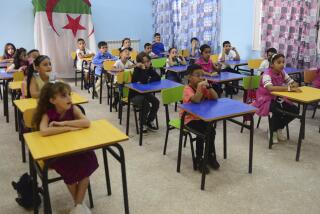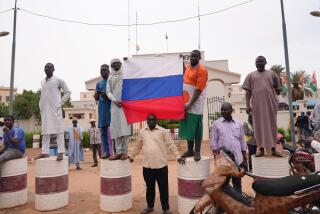Crackdown to Continue, Islamic Militants Told : Algeria: Up to 6,000 have been arrested so far. Restoring order is the first priority, leader says.
- Share via
ALGIERS — Up to 6,000 Algerians have been arrested so far in the government’s crackdown on Islamic fundamentalists, and President Mohammed Boudiaf vowed Sunday to continue the state of emergency in the face of a growing wave of attacks by armed militants against government forces.
“We have to save Algeria, and this is a consideration beyond any consideration,” Boudiaf said at a news conference. “The first objective is to re-establish the authority of the state, a state that is respected inside and out. Whoever is against this march, we will act against.”
At least eight people have died in incidents over the weekend, which continued Sunday with two police officers injured by gunmen in the suburbs south of Algiers and with shots fired at officers near the Treasury building in central Algiers and at a navy guard post near the port.
A 6-year-old girl was killed Friday in a five-minute hail of bullets streaming from the historic Casbah toward a public square guarded by riot police, and a police officer who died in a separate attack in the Casbah was buried in a tense ceremony Sunday morning.
Nearly 500 police officers and friends attended the interment, guarded by about 100 riot police posted on the surrounding rooftops and roadways. A total of 13 police officers have been killed by Muslim extremists, mostly in the area of the capital, in the past two weeks.
“The Algerians are fed up with these Fridays of terror, no doubt,” Boudiaf asserted in his first meeting with international journalists since the five-member High Committee of State he heads took over the reins of government from President Chadli Bendjedid last month.
Bendjedid was forced to resign Jan. 11 in the wake of widespread concern within the army that he would not be able to control an almost certain fundamentalist victory in Algeria’s first free national elections. A week-old state of emergency now appears certain to have delayed new presidential elections for at least a year, or possibly two years, sources close to the government say.
Boudiaf said that between 5,000 and 6,000 Algerians are now in detention camps authorized under the state of emergency, and he promised to continue the clampdown until stability is restored.
“All those who cause trouble to public order will be put in the camps,” the 72-year-old veteran of Algeria’s war of independence from France declared. “We are not in favor of repression, but we want our country to get back to a state of stability.”
Boudiaf also vowed to prevent the use of religion as a basis for political power, a process that began when Algeria became the first Arab country to legalize an Islamic political party. “The mosques have become rostrums for controlling people,” the president said. “This will not happen anymore.”
The Islamic Salvation Front, which the government has now moved to ban, has not been heard from recently, since it quietly canceled a massive public march that had been scheduled to follow weekly prayers on Friday. But hundreds of Islamic students marched Sunday at the University of Algiers to protest the government crackdown, waving Korans in the air and shouting, “Boudiaf assassin!”
Military sources said the Islamic Front’s military wing is still operating, despite the arrest of most of the front’s top leadership since June. But Islamic militants are believed to be having trouble acquiring weapons, despite caches of firearms believed to have been smuggled across the border from Niger and other less-guarded frontiers.
An earlier attack on a navy barracks at the port of Algiers was believed directed at an arms depot nearby. And a military official said Sunday that an Islamic militant with a small stockpile of Egyptian-made automatic weapons was arrested Saturday in the city of Batna, besieged last week by security forces in the face of a wave of Islamic attacks.
“It seems that to have a complete resistance, they will need a lot of arms and a lot of militants who have the desire to carry on the fight, and until now they have neither,” the official said. “All that’s happening now is reaction, not action.”
Boudiaf took pains to characterize the crackdown as an interruption of the electoral process, but not the democratic process, under which Algeria for the past three years has been emerging from three decades of one-party rule.
“The stopping of the electoral process has been made to safeguard democracy. The respect of democracy must not lead to the destruction of democracy,” Boudiaf said, referring to fears that a fundamentalist victory would lead to the dissolution of the constitution and the establishment of an Islamic state in Algeria.
The message was directed in large part toward the international community, from which Algeria is seeking economic aid and debt assistance as a key point of attack against the socioeconomic problems that have fed the fundamentalist movement.
A coalition of Western banks is considering a restructuring of the country’s huge foreign debt, which presently eats up more than 70% of revenues. Resolution of the relief plan has been stalled in large part by U.S. banks, and Boudiaf has dispatched emissaries to Europe and the Persian Gulf to talk up foreign investment and government aid to forestall additional troubles.
Prime Minister Sid Ahmed Ghozali is expected to unveil a new economic program this week to move the country away from three decades of Marxist policies that have left the government in control of most major industries. Boudiaf said the program’s major features include a continued move toward a market economy, encouraging the development of small and medium-size businesses, while preserving key state industries and guarding against “the excesses of wild capitalism.”
Ghozali also is in the process of restructuring the government, reducing the number of ministries and appointing new people to key positions. But Arab diplomats here said the move has been delayed because few are willing to accept positions in an army-backed government that many Algerians regard as unconstitutional.
“No significant person in political life has accepted to participate in the government while they know it is not a legal government,” said one envoy.
More to Read
Sign up for Essential California
The most important California stories and recommendations in your inbox every morning.
You may occasionally receive promotional content from the Los Angeles Times.













